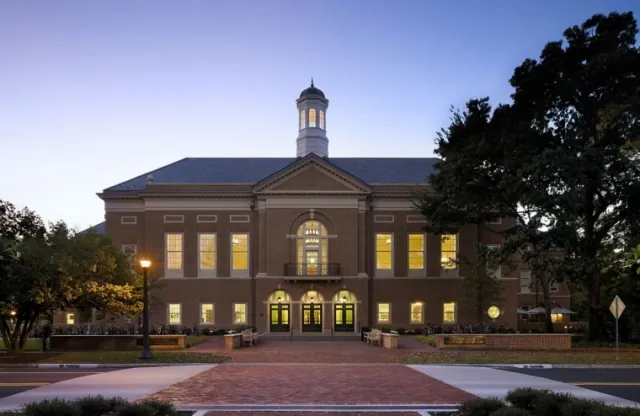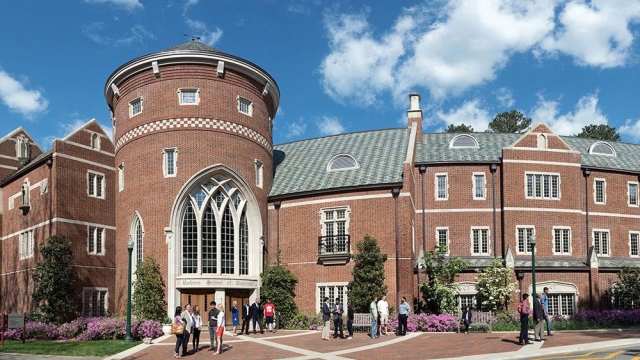University of Illinois
The University of Illinois isn’t a “sexy” business school. In fact, it is best best-known for accounting – not exactly a subject that stirs headlines. Here’s what the program has going for it: It is a solid and stealth. It performs well across all measures, a reflection on its strong fundamentals and consistent delivery.
“U-of-I’s curriculum involves a lot of project based classes, which requires students to balance a packed schedule of classes, scheduling group project meetings, and learning to work with many types of people,” says one 2015 graduate – channeling the school’s bread-and-butter ethos. ”This was crucial for preparing me for the business world, and working with people from all over the world, both in person and remotely, and being able to communicate effectively and efficiently.”
Illinois’ gains have been incremental. Average starting pay rose from $63,820 to $65,490 over the past year. The school’s placement rate has nearly inched above 90%. Average debt remained manageable at $24,191. At the same time, alumni scored the school well in areas like extracurricular activities and workplace preparation in P&Q’s annual survey. As a result, the school surged from 23rd to 18th in the P&Q rankings.
Here’s the kicker: In October, the school reeled in a $150 million dollar naming gift from Larry Gies, a Chicago-area entrepreneur and 1988 graduate. Even better, the gift is being earmarked for the undergraduate program says Jeff Brown, dean of the business school. “Unlike others that focus primarily on the MBA, the undergrad program is our crown jewel here. We’ll use the gift to continue creating an unparalleled undergraduate experience.” In other words, the school now possesses the resources to beef up programming and services for students. That could produces a virtuous cycle that could speed up Illinois’ momentum up the rankings – and increase the value of an Illinois business degree in the process.
The College of William and Mary (Mason)
How is this for a twist on the traditional education model? At Mason, students are trusted. They decide what they want to do. Sure, they’re required to choose a major from five areas. Beyond that, how they spend their time is up to them. Think of the Mason curriculum as a buffet – a have-it-your-way customized offering. Students can add a semester abroad or an internship to their plate…or not. It’s their call. Here, students have control of what’s important and what they want. Hence, you have the school motto: “You’re not one-dimensional, so why should your education be?”
Not surprisingly, alumni gave the school an A+ – a 9.7 score on a 10-point scale – when it comes to recommending the school. Funny thing is, the school received a 9.5 – another A+ – for preparing students for the world of work. Oh, faculty also enjoyed a 9.26 score – one of the highest among undergraduate business schools.
Of course, Mason is only looking for serious students, which is why just 18% of applicants are ultimately accepted. For those who make the cut, the business program is team-based and heavy on projects and presentations. The most (in) famous is the Simulation, a week-long online exercise where students walk through the steps of launching and maintaining a business. Working in 4-5 member teams that compete against each other, the simulation pulls everything together that students learn during their first semester, such as choosing pricing, framing ads, and choosing employee benefits. Afterwards, students author an annual company report and present it to actual executives.
It may not be a “real” business, but it is extremely effective, says one 2015 grad. “In addition to confronting business issues such as production constraints, customer demand projection, and marketing strategy, the experience was valuable because of the emphasis on team building and taking advantage of each team member’s unique skill set.”
The simulation isn’t the only offering that Mason students tout. The school also boasts a student-managed investment fund, along with an entrepreneurship center with seed funding and a wealth of consulting projects. One 2015 grad even reflects on a month-long social entrepreneurship field study in the Dominican Republic. “I followed a similar curriculum to the Peace Corps and I started my own business in a local community there. This experience taught me about every facet of business and challenged me to continue raising money for our venture and explore the world of international business, business for social good.”
University of Richmond (Robins)
The gap between business and the liberal arts has shrunk in recent years. For many, the disciplines ran at a people-versus-profit cross-purpose. Now, businesses are looking to use tools like logistics and financing to drive social change. At the same time, businesses are increasingly recognizing the value of a liberal arts degree: communication, analysis, synthesis, problem-solving, and cultural sensitivity.
Think of the University of Richmond as a liberal arts school par excellence. That’s one reason why Robins has emerged as a premier undergraduate business program. In P&Q’s 2017 ranking, it jumped from 30th to 21st – with stats that show it is on the cusp of breaking into the big leagues.
By the numbers, the school has everything that a student, parent, or employer could want. Let’s start with a generous financial aid package. Given to 55% of business majors, aid averages $39,267 at the school. Average SAT scores – a measure of student quality – are perched at 1410, 15th-highest in the country (and better than privates like Georgetown, Villanova, and Tulane). During school, Robins ranked among the top business programs for faculty quality and faculty availability according to alumni.
However, it is the all-important post-graduation performance where Robins truly shines. Nearly all (97.75%) of the 2017 class found jobs within 90 days of graduation. In addition, almost 95% of these business majors landed in positions they sought. Most impressive of all, they avoided major debt: Just 35% of the graduating class left with debt – and at a manageable $26,652, no less.
In short, Robins is hitting where it matters: academic quality, student satisfaction, and employment metrics. That bodes well for the school as its profile continues to rise.














Questions about this article? Email us or leave a comment below.